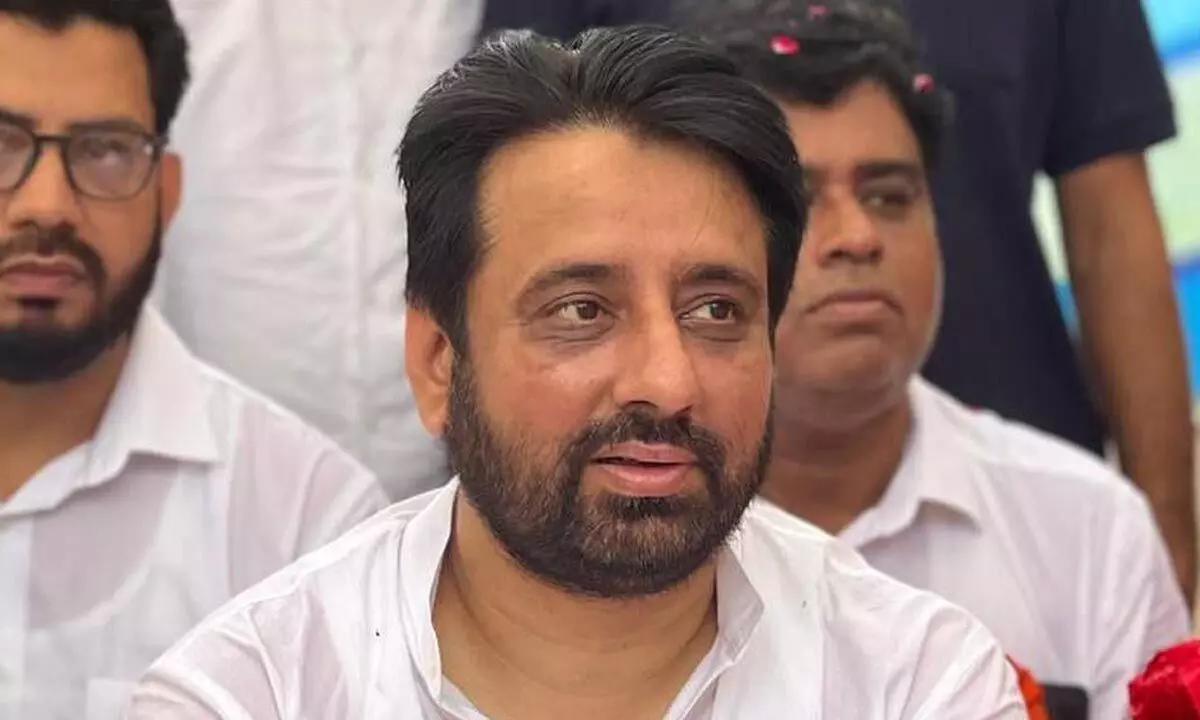Live
- Samsung Galaxy A06 5G Launched in India: Price, Features, and Availability
- Rekha Gupta Takes Oath as Delhi CM
- Ancelotti hails hat-trick hero Mbappe, says the forward has quality to reach Ronaldo's level
- Champions Trophy: Jadeja & Shami in, as Bangladesh opt to bat first against India
- How to Beat Wagering Requirements in Casino?
- Celebrate Love Your Pet Day with Clean and Safe floors for your Furry Friends!
- 10th Edition of RaceFor7 to flag off in Bengaluru and 21 Cities Across India Simultaneously
- IPL matches in Rajasthan to be organised by Sports Council
- Arguments in Vallabhaneni Vamsi's custody and health petitions completed
- Bihar Congress in-charge Krishna Allavaru reaches Patna, vows to strengthen party
Just In
Centre decides to take over 123 Delhi Waqf Board properties; Won't allow it, says chairman Khan

AAP MLA Amanatullah Khan
The Union Housing and Urban Affairs Ministry has decided to take over 123 properties of the Delhi Waqf Board, including mosques, dargahs and graveyards, evoking a sharp reaction from board chairman and AAP MLA Amanatullah Khan.
New Delhi: The Union Housing and Urban Affairs Ministry has decided to take over 123 properties of the Delhi Waqf Board, including mosques, dargahs and graveyards, evoking a sharp reaction from board chairman and AAP MLA Amanatullah Khan. Khan asserted that he will not allow the central government to take over the Waqf properties. The deputy land and development officer, in a letter to the board on February 8, informed it of the decision to "absolve" it from all matters pertaining to the 123 Waqf properties.
The Land and Development Office (L&DO) of the central ministry said the two-member committee headed by Justice (retired) S P Garg on the issue of denotified Waqf properties in its report submitted that no representation or objection was received by it from the Delhi Waqf Board. The committee was formed by the government of India on the order of the Delhi High Court, according to the L&DO letter. The L&DO said the Delhi Waqf Board was the main stakeholder/affected party to whom the opportunity was given by the committee. However, it did not appear before the committee or filed any representation or objection regarding 123 properties.
"It is evident from the above facts that Delhi Waqf Board does not have any stake in the listed properties, neither have they shown any interest in the properties nor filed any objections or claims. It is, therefore, decided to absolve Delhi Waqf Board from all matters pertaining to '123 Waqf Properties'," said the L&DO letter. Physical inspection of all the 123 properties will now be carried out by the L&DO. According to Khan, the L&DO has pasted notices at 123 properties, which has caused "widespread anxiety, fear and resentment" among the Muslim community. "We have already raised our voice in the court on 123 Waqf properties, our Writ Petition No.1961/2022 is pending in the High Court. "Some people are spreading lies about it, the proof of this is in front of all of you. We will not allow anyone to occupy the properties of the Waqf Board," he said in a tweet in Hindi.
The DWB chairman in a reply to the Deputy Land and Development Officer of the central ministry on Friday said that the Delhi Waqf Board had already filed a petition in the high court in January 2022 against the formation of a two-member committee on the basis of whose report the action has been initiated by the ministry. Khan said that the committee was informed on April 12 last year about Waqf Board's petition in the high court, challenging its formation and asking it to defer its proceedings until a final order was passed by the court. The matter is pending in the high court. He also said that before the two-member committee, a one-member panel was formed whose report was rejected without giving any reason.
Also, the government of India had allotted one of the 123 properties to the Indo-Tibetan Border Police (ITBP) on permanent basis, after which the Waqf Board had approached the high court. "Two-member committee has already submitted its report. However, no such report is shared with the Delhi Waqf Board. Hence, you are requested to share a complete set of the report with the Delhi Waqf Board urgently," Khan said. He claimed that there was no direction to constitute a two-member committee by the high court in its order dated August 20, 2014.
These 123 properties are used by the Muslim community. The day-to-day management of these 123 properties was done by Mutawallis or the management committees appointed by the Delhi Waqf Board, he said. The Delhi Waqf Board has a statutory right under Section 32 of the Waqf Act, 1995, to exercise the powers of general supervision, administration and control over these properties, he asserted. According to the Waqf Act, all the Waqf properties vest in the concerned Waqf Board, which in the present case, is Delhi Waqf Board, Khan said. The Waqf nature of the 123 properties was "innate" as all were religious structures like mosques, dargahs and graveyards. Some of them were given to the Delhi Waqf Board's predecessor - 'Sunni Majlis Auqaf - by the British ruler, he added.

© 2025 Hyderabad Media House Limited/The Hans India. All rights reserved. Powered by hocalwire.com




